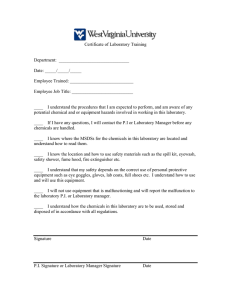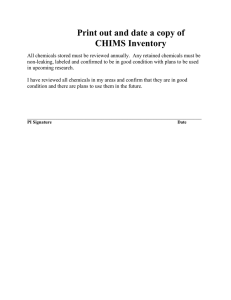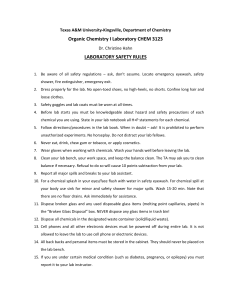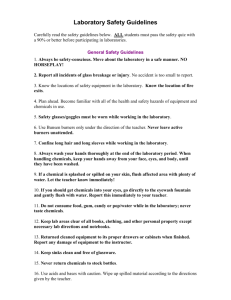Unit 1, Activity 1, Rules of Lab Conduct
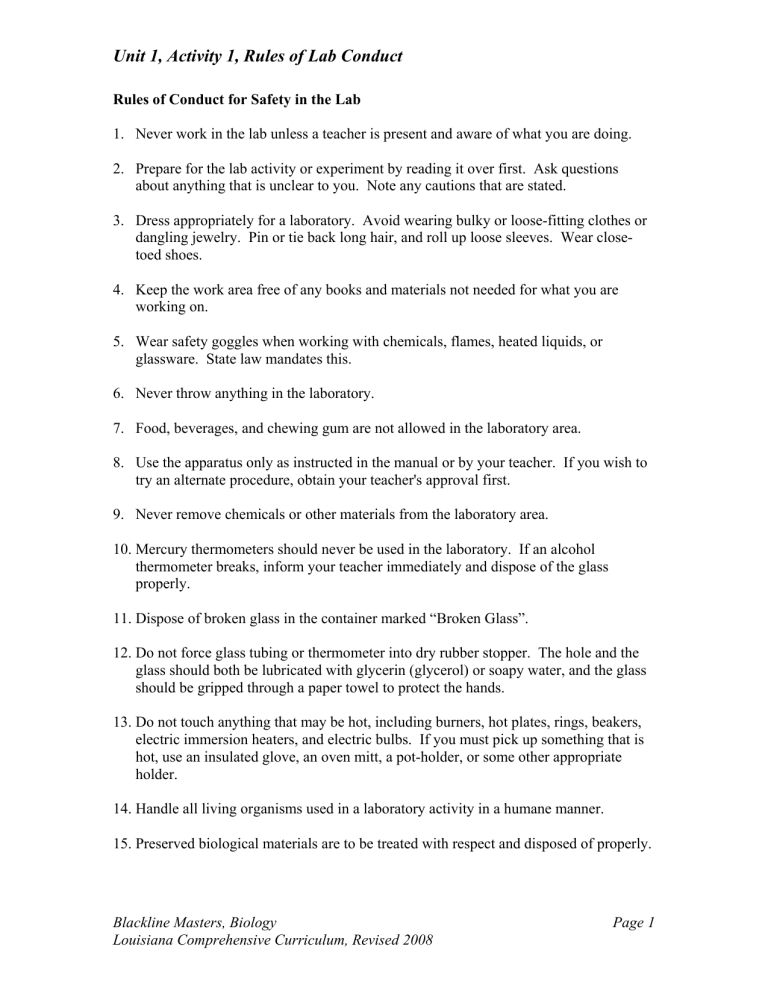
Unit 1, Activity 1, Rules of Lab Conduct
Rules of Conduct for Safety in the Lab
1.
Never work in the lab unless a teacher is present and aware of what you are doing.
2.
Prepare for the lab activity or experiment by reading it over first. Ask questions about anything that is unclear to you. Note any cautions that are stated.
3.
Dress appropriately for a laboratory. Avoid wearing bulky or loose-fitting clothes or dangling jewelry. Pin or tie back long hair, and roll up loose sleeves. Wear closetoed shoes.
4.
Keep the work area free of any books and materials not needed for what you are working on.
5.
Wear safety goggles when working with chemicals, flames, heated liquids, or glassware. State law mandates this.
6.
Never throw anything in the laboratory.
7.
Food, beverages, and chewing gum are not allowed in the laboratory area.
8.
Use the apparatus only as instructed in the manual or by your teacher. If you wish to try an alternate procedure, obtain your teacher's approval first.
9.
Never remove chemicals or other materials from the laboratory area.
10.
Mercury thermometers should never be used in the laboratory. If an alcohol thermometer breaks, inform your teacher immediately and dispose of the glass properly.
11.
Dispose of broken glass in the container marked “Broken Glass”.
12.
Do not force glass tubing or thermometer into dry rubber stopper. The hole and the glass should both be lubricated with glycerin (glycerol) or soapy water, and the glass should be gripped through a paper towel to protect the hands.
13.
Do not touch anything that may be hot, including burners, hot plates, rings, beakers, electric immersion heaters, and electric bulbs. If you must pick up something that is hot, use an insulated glove, an oven mitt, a pot-holder, or some other appropriate holder.
14.
Handle all living organisms used in a laboratory activity in a humane manner.
15.
Preserved biological materials are to be treated with respect and disposed of properly.
Blackline Masters, Biology
Louisiana Comprehensive Curriculum, Revised 2008
Page 1
Unit 1, Activity 1, Rules of Lab Conduct
16.
When using knives and other sharp instruments, always carry with tips and points pointing down and away. Always cut away from your body.
17.
All chemicals in the laboratory are to be considered dangerous. Do not touch, taste, or smell any chemicals unless specifically instructed to do so. The proper technique for smelling chemical fumes will be demonstrated to you.
18.
Check the label on chemical bottles twice before removing any of the contents. Take only as much chemical as you need.
19.
Acids must be handled with extreme care. You will be shown the proper method for diluting strong acids. Always add acid to water, swirl or stir the solution and be careful of the heat produced, particularly with sulfuric acid.
20.
When working with electric circuits, be sure that the current is turned off before making adjustments in the circuit.
21.
If you are connecting a voltmeter or ammeter to a circuit, have your teacher approve the connections before you turn the current on.
22.
Do not connect the terminals of a dry cell or battery to each other with a wire. Such a wire can become dangerously hot.
23.
Report any injuries, accidents, or breakages to your teacher immediately. Also report anything that you suspect may be malfunctioning.
24.
Work quietly so that you can hear any announcements concerning cautions and safety.
25.
Know the locations of fire extinguishers, fire blankets, safety shower, eye wash fountain, and the nearest exit.
26.
When you have finished your work, check that the water and gas are turned off and that electric circuits are disconnected.
27.
Dispose of all chemical waste properly. Never mix chemicals in sink drains. Sinks are to be used only for water and those solutions designated by the instructor. Solid chemicals, metals, matches, filter paper, and all other insoluble materials are to be disposed of in the proper waste containers, not in the sink.
28.
Return all materials and apparatus to the places designated by your teacher. Follow your teacher's directions for disposal of any waste materials. Clean the work area.
29.
Failure to wear safety glasses and/or involvement in horseplay or any flagrant disregard of safety rules will result in removal from the laboratory situation and a grade of zero for that activity.
Blackline Masters, Biology
Louisiana Comprehensive Curriculum, Revised 2008
Page 2
Unit 1, Activity 1, Student Safety Contract
Student Safety Agreement Please return this signed acknowledgement to the teacher.
I acknowledge that:
•
I have received a copy of the Rules of Laboratory Conduct for Safety in the Laboratory.
•
I have read and understand the policies and procedures as written in the rules for laboratory safety.
•
I know the location of safety equipment in the laboratory.
•
I understand the importance of adhering to the policies stated in the rules.
•
I have shared the information with my parent/guardian.
•
I understand that there is zero tolerance for unsafe practices during laboratory situations and that the teacher will remove whomever he/she deems is acting irresponsibly and that a grade of zero may result as a consequence of misconduct.
•
I understand that I will not be permitted to perform laboratory activities unless this contract is signed by both me and my parents (guardians) and is on file with the teacher.
I further agree to closely follow all other instructions, written or oral, given by the teacher in class.
Print name: __________________________Signature:__________________________
Parents/guardians:
Your signature on this contract indicates that you have read the Rules of Laboratory Conduct for
Safety in the Laboratory, are aware of the measures taken to ensure the safety of your son/daughter in the science laboratory, and will instruct your son/daughter to uphold his/her agreement to follow these rules and procedures in the laboratory.
Parents (guardians) signature: __________________________ Date: ______________
Blackline Masters, Biology
Louisiana Comprehensive Curriculum, Revised 2008
Page 3
